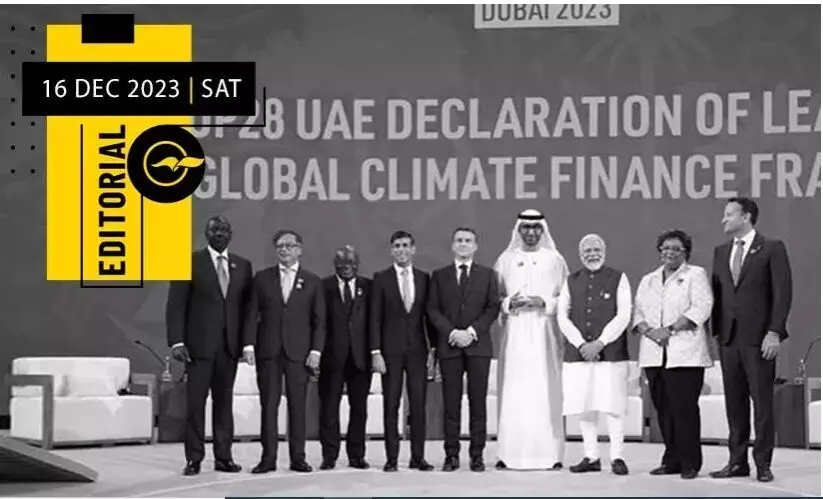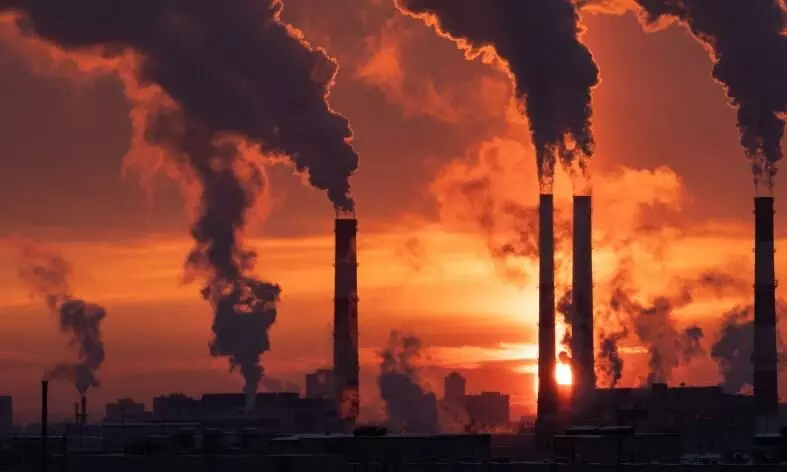
Balance sheet of the climate summit
text_fieldsThe 28th United Nations Climate Change Conference (COP28) concluded in Dubai yesterday with a mixed reaction from the global community. The agreement reached on the final day of the conference, while providing some hope, is not revolutionary. The most important directive in the agreement is that all fossil fuel production and consumption should be reduced to eliminate carbon emissions completely by 2050. In the earlier COP26 in Glasgow, only coal was subject to such controls. At that time, the conference ended without a final decision due to opposition from countries, including India. However, this time, the term coal was replaced by 'fossil fuels'. The initial agreement called for the complete abandonment of fossil fuels, but since it was found to be unworkable, the wording was changed to reduce their production and consumption. In a sense, this is a historic decision. Greenhouse gases, including carbon dioxide, are often cited as the main cause of global warming and climate change, but practical solutions for controlling their use are often not mandated. The uniqueness of the Dubai COP28 is that it broke that tradition. At the same time, it was a failure of the conference that the developed countries emitting large amounts of carbon emissions were unable to increase the amount of "loss and damage compensation tax" that they had to pay.
 Also Read - COP28 'stab-on-the-back' on affected nations: Greta Thunberg
Also Read - COP28 'stab-on-the-back' on affected nations: Greta Thunberg
Since 1992, the United Nations has been holding climate change conferences under its leadership. However, due to the opposition of major powers such as the United States, all of these conferences have ended as mere talk. However, after the Paris Conference in 2015, things have changed a bit. This change is because global warming and climate change have become the experience of the world, not just theory. For a long time, the phenomenon of climate change was considered to be in the category of myths. However, as the damage caused by climate change began to be reported continuously in various parts of the world, the international community's approach changed significantly. Even major powers have agreed in principle to reduce carbon emissions, which are the main cause of global warming. The popularity of the slogans of "green politics" has also gained worldwide acceptance. The reason why such conferences have received media attention like never before in the past is none other than this. The whole world was looking at Dubai Expo City for two weeks. The world has already realized that the declarations from here will determine the fate of this blue planet. However, if one asks if there were enough decisions and announcements to meet that realization, the answer will be No. One of the responses to the Paris Conference was to bring the temperature of the earth, which has risen due to global warming, back to its pre-industrial level. At most, it is not a problem if it is even one and a half degrees higher than it was at that time. However, temperatures have been recorded above that limit in many countries, including India. In other words, as many research institutes have warned, the earth is melting; Its ecosystems are being thrown into the flood. In this situation, the world needs urgent and drastic solutions. Along with this, there should be plans to rehabilitate the victims of climate change. Although all of these things were on the agenda of the conference as usual, there was no meaningful discussion.
 Also Read - COP28 climate summit results in first-ever fossil fuel reduction deal
Also Read - COP28 climate summit results in first-ever fossil fuel reduction deal
At the same time, the emergence of new voices of compromise and cooperation at the conference is a source of hope. The agreement mentioned above was adopted at the conference hosted by the United Arab Emirates, one of the countries that produce the most fossil fuels in the world. In a sense, this is a decision that will cause great economic losses to the Arab world. However, they have endorsed the new policy line with the confidence that they can overcome this crisis with the help of new technologies and other means. For this very reason, the agreement prepared under the title "Dubai Agreement" is historic. The UN estimates that 40% of the world's population are victims of climate change and global warming. The voices of unity that emerged from the conference can be evaluated as solidarity with the people who are experiencing the damage of these changes that are happening rapidly in the sea and on land.

























